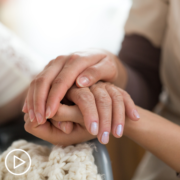Caregiver Support: Taking Care of YOU
Caregiver Support: Taking Care of YOU from Patient Empowerment Network on Vimeo.
Prostate cancer caregivers support patients in many ways, but also need support for themselves. Social worker Linda Mathew details the role of caregivers and shares resources to help them maintain their own self-care.
Linda Mathew is a Senior Clinical Social Worker at Memorial Sloan Kettering Cancer Center. Learn more here.
See more from The Pro-Active Prostate Cancer Patient Toolkit
Related Resources

|

|

|
Transcript:
Linda Mathew:
So, caregivers have a really important role in caring for their loved ones, so whether it’s their spouse, or a sibling, or a child, they – their role 1). Is to advocate as well for the patient in terms of saying, “Hey, you know what? Let me call the doctor’s office. This side effect was on the list, but I’ve noticed that it’s ongoing, so let me reach out to the office for you if you’re not feeling well.”
They are the eyes and ears for their patient or for their loved one in terms of just saying, “Something is not right. Let me call.” And, most of our nurse practitioners or nurse office practice nurses will say to the caregiver, “You are our eyes and ears when you’re at home. When the patient is here, we’re the eyes and ears for that person to assess what’s going on.”
But also, the caregiver really – sometimes, what happens is there’s a role reversal, so they become that emotional support for the loved one, the financial support, practical support, and also the spiritual support for their loved one, and we remind them that is your – that is a huge role to play, and there’s no handbook for it, but we have resources for you, so you’re not alone in that process.
And, the one thing we really stress is here at Memorial Sloan Kettering Cancer Center, we recognize the important role of our caregivers and how important they are to the loved one that they’re caring for. So, with that resource-wise, the social work department has a program called Reach for Caregivers, and it’s a hospital-wide program that we offer support groups as well as educational workshops.
And then, in November, being Caregiver Month, we put on a lot of different programs just for our caregivers to know we recognize you, we know you need the support, so here it is. So, in terms of support groups we offer, it’s all online because we know that sometimes, the caregiver is also working outside of the home, so to help meet them where they are, we’ve offered an online support group that they can tap into during their lunch hour, or even after work.










